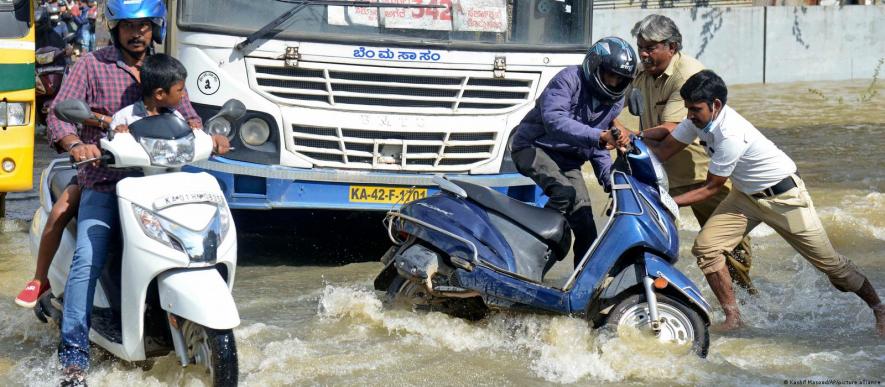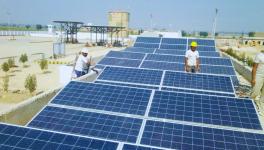India: Cities Struggle to Cope With Environmental Threats

The first ten days of October saw Delhi receive the highest monthly rainfall ever recorded in 66 years. Soon, the Indian capital region was inundated as waterlogging submerged parts of the territory.
The heavy showers laid bare how woefully underprepared the city is for unprecedented rains.
A month earlier, Bangalore, a tech hub in southern India, faced a similar experience.
Anushka Dey reached the city on the night of September 4 when India's "Silicon Valley" received 131.6 millimeters (5 inches) of rainfall, the highest for that time of the year in almost a decade.
The Mumbai-based senior sales manager was in town for a five-day series of meetings and had booked a hotel right across the street from the office where she was to work from.
But Dey was never able to cross the street and make it to the office. By the next morning, the roads all around were flooded. The waterlogging had also damaged the electricity unit in the office basement and access to the building was closed off.
"After three days of being stranded in the hotel, we were advised to make our way back to Mumbai," she said.
Visuals on social media showed an inundated Bangalore as its inhabitants waded through waist-deep waters and in many neighborhoods, on boats and rafts, to procure essential provisions.
Failure of urban planning and development strategy?
The northern state of Uttar Pradesh also faced unusually heavy rains in September and October. The floods in October affected 5.8 million people. Incidentally, the region was undergoing drought-like conditions in July.
These instances of extreme weather conditions have shown how vulnerable Indian cities are to environmental threats and climate change.
An Intergovernmental Panel on Climate Change (IPCC) report published in March 2022 warned that Kolkata, in eastern India, faces a high "risk of subsidence due to sea-level rise and flooding" triggered by climate change.
In November 2021, floods caused by incessant overnight rains brought the southern city of Chennai to a standstill.
Climate change is one of the primary reasons for hazardous weather conditions — including the unprecedented rains — and its impact on the urban infrastructure needs to be accounted for, said Ravichandar V, an urban infrastructure expert from Bangalore.
"Our urban planning does not take into account effects of climate change and extreme weather. One example — we still plan for 75 millimeters per hour average peak rainfall when we are already experiencing over 125 millimeters per hour peak rainfall," he pointed out.
![]()

'Our urban planning does not take into account effects of climate change and extreme weather,' said Ravichandar V, an urban infrastructure expertImage: Sri Loganathan/ZUMA Press Wire/picture alliance
Echoing a similar view, academic Nabajit Hazarika said that nothing substantial was being done to adapt India's urban infrastructure for climate change.
Hazarika, who is an assistant professor of environmental biology and wildlife sciences at Cotton University in Guwahati city, underlined that "policy level changes" and "infrastructural changes to cope with climate extremes" were urgently needed.
Not much thought to environmental threats
Experts stress that the country's rapid urbanization without much consideration for environmental risks is a major flaw in the development model of these cities.
TV Ramachandra, head of the Centre for Ecological Sciences at the Indian Institute of Science (IISc), said that he doesn't see any adaptation to climate change in urban planning.
"Despite the change of rainfall pattern and intensity, there have been no steps to ensure the water flows, no attempt to protect open spaces," he underlined.
Adish Siddapur Matada, an architect and urban designer with Amalgrain Studio in Bangalore, noted that rapid concretization was hindering rainwater from flowing into the underlying layer of the soil.
"Now, with concretization, there is no infiltration," he said. "Instead, water is now flowing over the ground."
In Bangalore, along with this, the encroachment of wetlands and modifications of stormwater drains that were meant to divert rainwater into natural bodies of water, are also contributing to the frequent floodings, Matada said.
Challenges of adapting to climate problems
There are unique difficulties in adapting infrastructure to climate problems. One of the challenges is that "infrastructural systems are typically designed long-term, around 50-100 years," said Neha Goel Tripathi, a professor of environmental planning at the School of Planning and Architecture in New Delhi.
"It is not easy to adapt existing infrastructure to unprecedented and extreme climate change-related events."
At the same time, Tripathi stressed the importance of building climate-resilient cities.
She pointed out a structured approach that included understanding climate-related vulnerabilities and challenges for specific cities, the inclusion of local communities, and urban planners incorporating resilient city toolkits and networks into future infrastructure projects.
Hazarika said there is also a need for regulating land use and coming up with building codes to address climate hazards. Additionally, it iss important to find out who in the cities are most at risk and equip them to handle climate extremes.
Ramachandra, however, criticized the authorities for lacking a proper understanding of the implications of climate change. "It's the common man who bears the brunt and is left to fend for themselves."
Edited by: Srinivas Mazumdaru
Get the latest reports & analysis with people's perspective on Protests, movements & deep analytical videos, discussions of the current affairs in your Telegram app. Subscribe to NewsClick's Telegram channel & get Real-Time updates on stories, as they get published on our website.
























